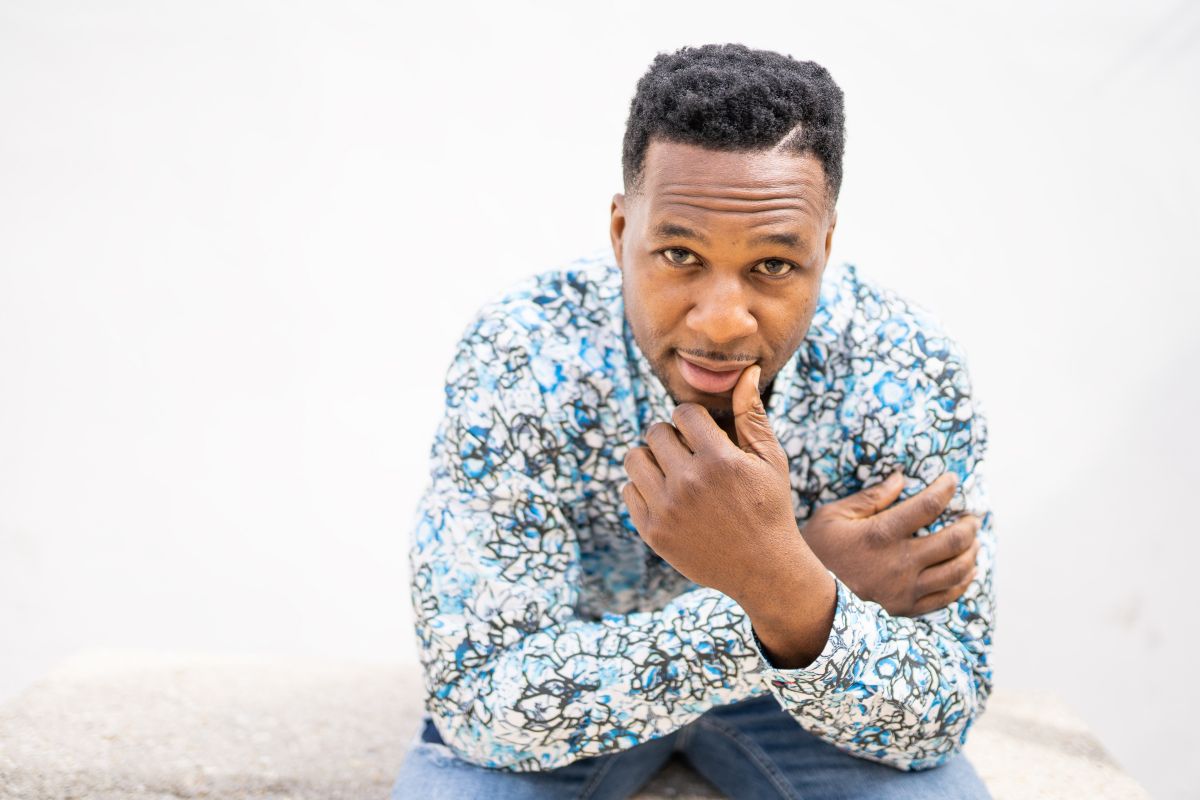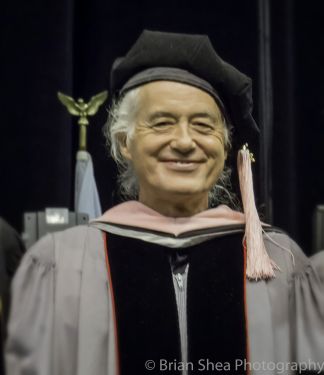1977 has been a magic year for music in general but, for Blues and Blues/Rock, a very special one. Some of the most formidable and talented guitarists and singers/songwriters of the current generation were born, coincidentally, all in that same year, all elevating enormously, through their musicianship and in the last three decades especially, a genre that was lacking in creativity, after the passing of inspirational and pivotal artists of the genre like Jimi Hendrix, Rory Gallagher, Stevie Ray Vaughan and Gary Moore, among others.
Undoubtedly, one of the finest Blues/Rock artists emerging from that special year for music, is New Jersey-born Pedal Steel Guitar master Robert Randolph. Since 2001, together with his band called The Family (the name is not coincidental, being the band members all related to Randolph), this eclectic and ultra-creative artist has brought to the contemporary Blues/Rock table exciting new ideas, by adding to the genre an explosive combo coming from Randolph's musical roots, strongly rooted into Gospel, Funk, Soul and Church Music in its entirety, the kind of music the American artist grew with.
With a brand new album just released and called Brighter Days, Randolph has certainly reinforced, through some of the best songs ever written by the Pedal Street Guitar guru, that symbolic bridge between music and life, by reinforcing the principle of trying to live life at its very best, organically and with positivity, that very same positivity that strongly emerges from the sounds and the lyrics present on Brighter Days.
Bluebird Reviews had the privilege to talk with Randolph in one of the very rare short breaks from his live touring schedule, to discuss the making of Brighter Days and what does the new album bring, into the life and career of the guitarist and singer/songwriter.

BR – Hi Robert, thank you so much for talking to us at Bluebird Reviews and many congratulations on your brand new album Brighter Days, a record that our website found among the most inspired and cohesive of your whole career to date. Did you have in mind already a clear idea, before entering the studio and start working on what then became Brighter Days, about how you wanted the album to sound like, from a sonic perspective?
RR - Well, we wanted to share our vision of that joy and that feeling that genres like Gospel and Blues carry within. We wanted to have choirs, we wanted to sound big and share all those moods with fans, like we were in a church. That was the direction that we wanted to go for and we really tried our best to capture all those different sounds and moods which we sought out to do and we really felt that we achieved that goal, through this album and we were all excited about that. I remember that our producer, Dave Cobb, which I chose based on his great experience in different music genres, when we started talking about the album, I found out that he himself grew up in a local gospel Pentecostal Church in Georgia over here. At that point, we soon realized that we both shared the same vision, about this album, because we were coming, fundamentally, from similar roots. That was something that certainly made the making of the album even easier.
BR – After the release of that splendid record that is 2013’s Lickety Split, an album that we have vastly enjoyed, Brighter Days sounds to us today as the most natural evolution of your previous studio album Got Soul, with yourself and The Family reconnecting not only deeply with your musical roots (Gospel and Church Music) but also showcasing in full, at the same time, your unique style that incorporates layers of Blues and Rock in the inimitable Robert Randolph’s fashion. Did you ever, at any stage of the making of Brighter Days, have the feeling that what you were unconsciously doing a 360 degrees full circle of your musicianship?
RR - To be honest with you, I don't think that I had the total realization of the scale of what we were accomplishing, on the new record but I just knew what we sought out to do, which is making music and songs that would inspire people. Through the album's songs, we really wanted for the world to know the story about where I came from, how much my pedal steel guitar played an important role in my life overall and be a massive influence for me about my love for Gospel and Church Music in general. I wanted also, through my songs, to tell stories about togetherness and bring joy to people’s lives and being able to uplift people. That was really the goal of it all.
BR – From a vocal aspect, Brighter Days sees you strengthening up even further your already strong singing style. Did you feel that working with producer Dave Cobb helped a lot in enhancing even more your powerful singing skills?
RR - He certainly helped us to grow, no doubts. You know, I have been in a lot of studios, throughout my career, with different producers and, you know, great vocals are always a tricky thing to achieve, with words to be pronounced in a certain way and so on. Dave Cobb is that kind of guy that would tell you, as he did with us, that he is not going to put mics in a certain way in order to get a better recording of your vocals, because to him, there are no certain ways to record vocals. He would rather tell you just to get comfortable, either to stand still or sit down or whichever way makes you feel better, when you sing, which is, quintessentially, what allows the voice to be the wonderful instrument that it is. When you start thinking about guys like Jimi Hendrix, for example, that was what they did, in those days. He was very much comfortable in singing his songs in the way he wanted and how he wanted, without trying to be or sound like anybody else.
BR – There are so many touching moments, lyrically speaking, on Brighter Days, from the opener Baptise Me, Have Mercy to Pops Staples’ Simple Man, among others. Which of the songs included in Brighter Days presented a harder task to finish for you, lyrically speaking?
RR - I would probably say the song called Don't Fight It, which carries in its lyrics points about life and about trying to express the importance to people to accept themselves as they are and their positivity they have inside, without fighting their real nature and their purity and let themselves to be the expression of what they really are. Through the lyrics of that song, that feeling was what we were trying to achieve and I hope we did so.
BR – You have often mentioned, in past interviews, the importance of having a family with you all the time in every sense of the word, as your band and as your family. How much, do you feel, the concept of family resonates musically and lyrically in Brighter Days? Because to me, it does more than any of your previous records.
RR - Well, it's really about just trying to have all these different influences from Church and Gospel music, you know and the idea of family, it is something that comes naturally through Church and Gospel music. If you look at certain songs, especially vocally, like I'm Living Off The Love You Give, which is an old Little Milton song, there's a mood that we all, as a band and as a family, together, between the vocals and the music combine that you cannot certainly recreate with any other studio musicians, because it would be a whole different thing. Having your family as your band, it makes ways easier to incorporates roots in your sound that we already have, because it's what we grew up with and that is such a key factor.
BR – One of the many aspects of your incredible musicianship that we deeply appreciate, Robert, it is the fact that you don’t fall into the same temptations of some of your fellow Blues and Blues/Rock musician friends, about having Special Guests featured in your records, but you rather prefer to let your music and your talent to flow and to speak naturally and organically to millions of people out there, just through your inner artistry. Have you ever had, throughout your career, any pressure at all from record labels about having Special Guests featured in your records solely for commercial purposes?
RR - You know, the beauty of working with someone like Dave Cobb, it's that he doesn't consider what may sound commercial or what doesn't, when it comes to music. He would just tell you "Let's write a good song" and that would be it. And I share his views. To me, what really resonated with people, when I was growing up, was the importance to give them good songs, for me to play my best and my hardest and, by doing that, people will get you. At the end of the day, if a song is a good song, that will resonate immediately to people and once that you reach that goal, through a song, you don't worry about the commercial aspect of it at all, because you created a connection with people, through that song. I feel that this is something that all the greatest musicians aim to achieve and something I aspire to do too, through my songs.
BR – Cry Over Me, to us, it is the one of the most beautiful songs you have ever written in your career so far. Can you tell us a bit more, please, about the story behind the lyrics and the way that you built that breathtakingly fabulous arrangement?
RR - The arrangement of that particular song, as it happened in other songs of the album, say like in Have Mercy or Baptise Me, for example, is all just about being organic, as a collective. As we agreed with Dave Cobb, at the time we started to work on Brighter Days, all that we wanted was just to follow our instinct as musicians, without being predictable. For Cry Over Me, lyrically the song is fundamentally about the journey of this musician, this guy on the road that meets a girl. It's a song that, in my mind, stylistically is a kind of crossroad between Bob Seger's writing style and Greg Allman's singing style and I am glad you enjoyed it.
BR – Robert, often a record is the sonic photograph of an artist’s moment in time in his life. How accurate is Brighter Days in displaying where you are musically and personally, as an artist and as a human kind?
RR - I feel that Brighter Days paints a very accurate portrait of where and who I am, right now, at this stage of my life and career. I feel I am a person that loves to bring joy to people, through my songs. I always wanted, as a musician, to write songs like Baptise Me, for example, which has those Blues and Rock elements, with strong lyrics and allow me to display my skills as a guitarist. Songs like these are what moves me and also, I hope the listener, because through my songs, the listener gets to know who I am. With this album, I also feel that Robert Randolph & The Family Band had the opportunity to carry forward the legacy of artists that we truly love and respect, like Pops Staples and The Staples Singers. As you know, they have been so instrumental in bringing genres like Gospel out of a church context, simply by applying their artistry and carrying that music into what we now call Mainstream or World Music. Because they have been so inspirational, to me especially, to be able to embrace the positivity and the spirituality coming from their example and moving it forward in my own way, it is a privilege. Brighter Days is a record I am very proud of. Working with Dave Cobb was, again, really great, because he was able to capture all those things that matter to me, like love, peace, happiness, health and the brighter side of life overall. Positivity is key of life, for me and I feel that Brighter Days encapsules well, through its songs, where I am, right now, in many different ways


